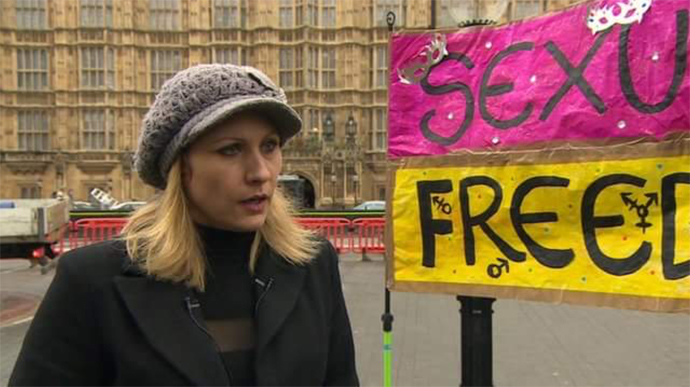Northern Ireland’s sex trade ban has left prostitutes in fear of “danger and poverty.” In an in-depth interview with RT, one sex worker challenged the idea of the law spreading to England, claiming “too many” influential people visit prostitutes.
Paying for sex became illegal in Northern Ireland under the Human Trafficking and Exploitation Act 2015 last week. Prostitutes who rely on their trade as a main source of income are now being forced to travel to work across the borders to survive.
Sex worker and former parliamentary candidate for Clacton, Charlotte Rose, has been evicted twice by landlords because of her occupation. The 35-year-old mother of two became a prostitute by choice at the age of 17 and hasn’t looked back since.

The ban will “put a huge amount of stress on sex workers, especially those who are mothers,” she told RT.
“They will have to think about child and travelling costs, which will rise,” she added.
The law was instigated by DUP MLA Lord Maurice Morrow. He said the initial aim was to “send a strong message that our society will not tolerate human trafficking.”
In a statement he admitted it wouldn’t necessarily “eradicate trafficking” as it “may prove impossible” but this “doesn’t mean we shouldn’t try.”
An Immigrant Council of Ireland study revealed the prostitution crackdown led to a 50-percent increase in online sex trade activity in Ireland, particularly in the border counties.
Anti-trafficking consultant with the ICI, Denise Charlton, said: “We expect to see this to increase even more” now the law is in place.
‘Leaving vulnerable prostitutes in danger and poverty’
Rose says prostitutes will start to attract more “risk taking” and “dangerous” clients as a result of the legislation.
“We’d all be in fear, and this is where the law has gone wrong,” Rose said.

Agreeing with her claims, Suzanne from the Sex Workers’ Alliance Ireland told RT the law will only “push sex workers further underground and put them in more danger.”
Sex workers will no longer feel safe reporting to the police and “may turn to pimps to protect them instead,” she said.
When asked if the law could benefit sex workers in any way, Rose said legalizing brothels that allow more than one woman to work together in safety is a better solution.
We asked #sexwork-ers in N Ireland thoughts on the new law. Here's response no.4 #FeministFutures#rightsnotrescuepic.twitter.com/wgvib2kofk
— SWAI Ireland (@SWAIIreland) June 12, 2015
A prostitute who is unable to have another worker present with them in the room during a session means they are at higher risk of being abused.
“I’m not allowed to be safe at work, because of the government’s decision that stops two women working together to keep safe,” she said.
A study led by the Department of Justice revealed that 22 percent of Northern Irish prostitutes turned to the sex trade in order to survive and 18 percent did so to support their families financially.
One third had children. The vast majority are women.
It also found that 61 percent of local workers thought the “Swedish” style system, on which the Irish legislation is based, would make them less safe.
I'm SCUNNERED with politicians desperately trying to make a name for themselves by throwing sex workers under the bus.
— Laura Lee (@GlasgaeLauraLee) June 8, 2015
Lord Morrow argues the law will rescue those who are “trapped in slavery” but he failed to mention how it would benefit those who participate in the industry by choice.
“This is why everyone assumes we are all financially, mentally unstable and drug addicts,” said Rose, who blames the government for the stigmatization of sex workers in society.
Emily Major, another sex worker who is based in Northern Ireland, told RT the law is having an impact on her, but her phone “still hasn’t stopped ringing.”
I'm on cam now at #AdultWork.com. Come check me out! (No registration required!) http://t.co/WIGjdKlEar
— EnglishEmily (@bbwemily88) May 10, 2015
“Now I’m unable to vet clients before they arrive and discuss services offered, there is a higher chance of them expecting things that aren’t on offer and this will cause violence,” she said.
“It’s disgusting taking this right away from women who feel this is the only way to make a living, taking away their last hope to give their children the upbringing they deserve.”
Director of the National Women’s council of Ireland, Orla O’Connor, rejects the idea the law will result in greater poverty.
“Prostitution is not a solution to women’s poverty, it impoverishes women further,” she told RT.
Criminalizing the buyers of sex in Northern Ireland will “ensure women and girls in vulnerable situations are safe and can make a smooth transition to an economically empowered position,” she added.
‘End Prostitution Now in Scotland!’
The law has inspired ‘End Prostitution Now’ campaigners in Scotland to apply pressure on the Scottish government to ban the trade in their region.
I have submitted amendments seeking to ban the purchase of sex in the Scottish Government's Human Trafficking and... http://t.co/t5BiZRfVls
— Rhoda Grant (@RhodaGrant) June 8, 2015
The Women’s Support Project, leading the campaign, is calling for “better support” to help people escape the sex industry.
Project member Liz Curran said: “Prostitution is abuse, often extreme or violent in nature. It is never a matter of choice, nor is it a human right as some campaigners argue.”
READ MORE: Thousands embrace sex work to fund university costs, study finds
“No reasonable person wants the right to be sexually exploited, abused, demeaned, disadvantage, social-excluded and marginalized. Prostitution ruins lives.”
Rose did admit to being discriminated against. She told RT she had been evicted from two homes because of her occupation.
“I’ve lost two properties because of my career choice. My landlord found out when I did a documentary.”
“That discrimination will always follow me from house to house."
"They don’t see me as normal. They think I’m a dirty fallen woman who’s got to be addicted to something.”
She condemned the campaign, however, branding it “ridiculous.”
“I think the End Prostitution Now campaign in Scotland is ridiculous. People just need to accept our industry and allow prostitutes to be safe,” she added.
‘Northern Ireland’s new laws should be extended to England’
Former detective Alan Caton, who led a case in Ipswich concerning five women murdered by sex buyer Steve Wright, is in favor of the law and hopes it will soon extend to England.
#HeartNews Judges have ruled the whole life sentence given to #Ipswich prostitute murderer Steve Wright is legal: http://t.co/3ZAiS09jzO
— East Anglia News (@HeartAngliaNews) February 18, 2014
He told RT he “fully supports the new laws” and thinks it would do a great deal to “protect women from pimps, traffickers and those who abuse and exploit women.”
In a letter to the Guardian, he said prostitution is a “violent act against women and a barrier to gender equality.”
“But don’t punish the victims,” he said. It is unacceptable to turn a blind eye to men who feel entitled to “sexually exploit vulnerable women,” he added.
When working on the case, he said he managed to “crack down on curb crawlers” and divert women away from the criminal justice system. However, the prostitution laws in England prevented him from “tackling demand for off-street prostitution.”
‘Too many politicians visit prostitutes’
Rose, a former parliamentary candidate for Clacton, says it’s unlikely the law will reach England as her “good clients” are powerful figures including Westminster politicians.
“Politicians, lots of politicians visit ... but I’m not naming names,” she said.
“If this law ever came to England, those good clients, those politicians would no longer come to see me,” she added.
The claim isn’t without precedent. Last year, Conservative MP Mark Menzies resigned after a Sunday Mirror investigation exposed his affair with a 19-year-old male prostitute.
The Fylde Conservative MP, Mark Menzies, has resigned as a ministerial aide in response to allegations made by a prostitute.
— BBC Lancashire (@BBCLancashire) March 30, 2014
Rose also told RT that police officers, judges and priests visit her regularly for her sexual services. Her claims of custom among the clergy appear to contradict the religious agenda behind the legislation.
Christian charity CARE in Northern Ireland are also backing the law, claiming it will be one of the principal drivers behind fighting trafficking in the region.
The charity’s policy officer Mark Baille said the laws “have the desired effect in helping victims of exploitation.”
Lord Morrow said his faith in Christianity drove him to push forward his sex trade ban.
But Rose, who is an atheist, dismissed the role of religion. She cited the Crossbones cemetery that contains unnamed prostitutes, some of whom allegedly did Christian work. The post-medieval graveyard in South London closed in 1853. Nearly 15,000 diseased prostitutes were buried there because they weren’t allowed to be given a Christian burial.
“Christians were once in charge of the sex industry,” Rose claimed.
‘Introducing more safety measures is the only way we can be saved’
Speaking on behalf of many other sex workers in the UK, Rose said: “Decriminalization and more safety measures is all we want.”
She urges the government to recognize the realities of sex work, so as to “actually reduce trafficking.”
"We've looked w horror at the Swedish model spreading...this is disastrous for SW rights globally" Open Society Foundation #ICRSE2015
— SWAI Ireland (@SWAIIreland) June 4, 2015
“We’re not vermin, we’re not going to go,” she said. Sex workers who face difficulties should be supported, she added. “Instead of helping the needy, they’re creating hardship. We must be looking at safety measures instead of banning.”
If the government really wants to know what the industry needs “they need to ask and listen to us, not assume.”

